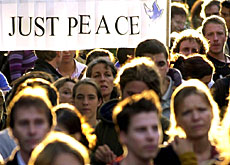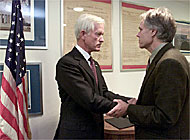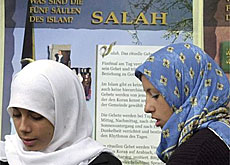Sympathy for US has worn thin

The United States' heavy-handed approach since September 11 has eroded much of the sympathy felt by the Swiss towards America.
As Switzerland prepares to join the United Nations – a day before September 11 – the Swiss are increasingly uneasy about the US’s undermining of the multilateral system.
Like most friendly countries, Switzerland was shocked and supportive in the wake of the September 11 terrorist attacks. But since then, even if bilateral ties remain friendly, the US’s increasingly unilateralist policies have created tensions.
“Switzerland now faces an American administration that is manifestly under the control of hardliners, and this poses problems for relations between the two countries,” says Victor-Yves Ghebali, a professor at Geneva’s Graduate Institute of International Studies.
He says the Swiss government is in the same boat as other countries. “It is certainly unhappy or uncomfortable about many of the stands taken by the Americans. But it’s as helpless as the rest of the international community.”
Bad president
Public sympathy for the US seems to have waned, too. A recent survey in the French-speaking Swiss newspaper, “Dimanche.ch”, found that of the 613 people asked, 71 per cent said they were worried by the US foreign policy and 65 per cent considered George W Bush to be a bad president.
Officially, the Swiss government is more diplomatic, but the unhappiness simmering beneath the surface is evident.
Erwin Hofer, the Swiss Foreign Ministry official responsible for relations with the United Nations, says the US’s “war on terror” has largely been conducted within a UN framework.
Ignoring allies
But he adds that Washington has no hesitation in ignoring its allies when it feels the situation demands it.
“On the other hand, there is a selective approach on certain issues, and this is regrettable,” Hofer told swissinfo. He said countries could not pick and choose when they would use multilateral channels to further their interests.
“Joining ranks in a multinational system is much more efficient and politically much more stable than going it alone,” he added.
Already the Swiss government has stood up to American pressure. It has demanded that inmates at Camp X in Guantanamo Bay be granted prisoner of war status, and it has refused to sign a bilateral deal exempting Americans from appearing before the new International Criminal Court.
Priority issues
The behaviour of the Bush administration must be even more disconcerting for the Swiss because it has often adopted a maverick approach on precisely those issues that Switzerland deems priorities: international humanitarian law, the environment, development cooperation, arms control and international trade.
The UN system that the Swiss are now joining is frequently regarded by Washington as an obstacle to its aims – and a growing number of international treaties and conventions have been blocked or disregarded.
“The United Nations without an active, constructive and reliable United States is not the United Nations,” says political analyst, Curt Gasteyger.
One of Switzerland’s chief initial tasks will be trying to persuade the US to be more cooperative, he told swissinfo. “Switzerland is in good company. I don’t think the US’s relations with Switzerland will be more seriously affected than those with other western countries.”
Erwin Hofer says that attempts to arrest climate change or to establish a functioning International Criminal Court can only succeed with “universal adherence”.
“We will strongly defend this principle,” he says.
swissinfo, Roy Probert
The US has antagonised its allies by:
seeking to make US soldiers exempt from prosecution at the new International Criminal Court;
consigning the anti-ballistic missile treaty to the dustbin by pressing ahead with a “son of star wars” defence system;
withdrawing from the Kyoto treaty on climate change;
refusing to classify Taliban and al-Qaeda fighters captured in Afghanistan as prisoners of war, as required under the Geneva Conventions;
contravening World Trade Organisation rules by imposing high tariffs on steel imports, and;
trying to block a crucial protocol to the UN convention against torture.

In compliance with the JTI standards
More: SWI swissinfo.ch certified by the Journalism Trust Initiative




You can find an overview of ongoing debates with our journalists here. Please join us!
If you want to start a conversation about a topic raised in this article or want to report factual errors, email us at english@swissinfo.ch.